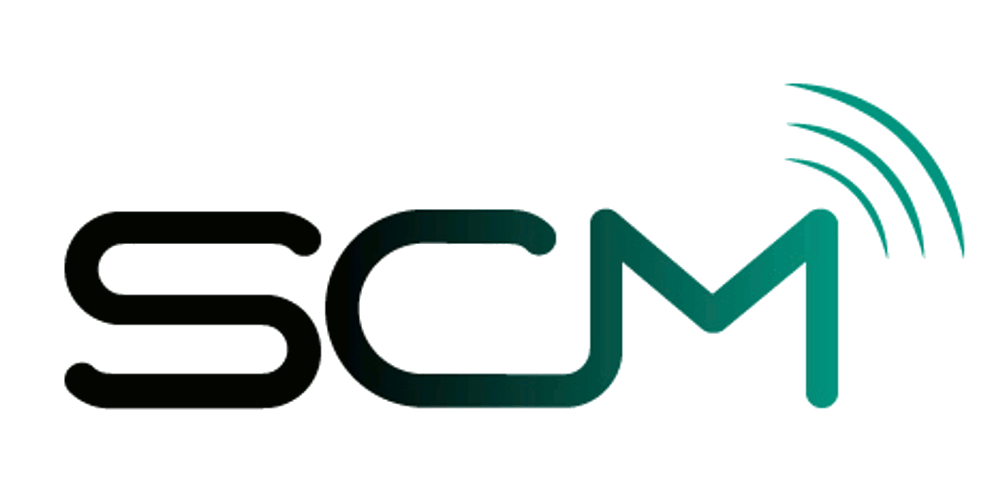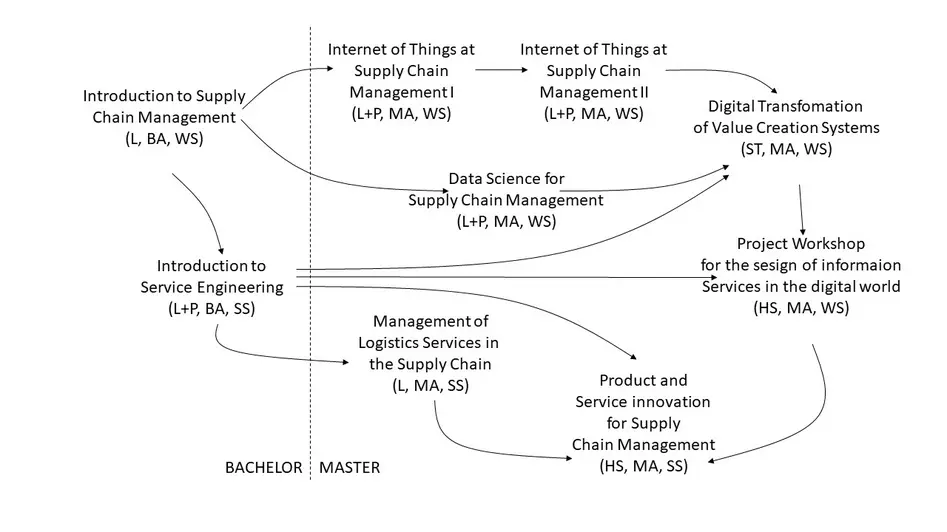Studies
The focus of our chair is on business issues related to the use of innovative information and communication technologies in global supply chains or value creation processes of the economy. You will build up a sound knowledge of the opportunities and limitations of relevant technologies today and in the future, learn to assess opportunities for process optimization, and learn to better design supply chains with the help of new data-driven services.
Overview of our teaching offers
First details about our teaching offers
In the course "Introduction to Service Engineering (SCM-B-01)" (summer term), which is designed for the Bachelor's program, mainly basic theories as well as fundamental procedures and methods of service engineering are presented and explained in the context of logistics and SCM. We recommend attending this lecture if you want to participate in our master courses later on. Furthermore, the chair offers a basic course entitled "Introduction to Supply Chain Management (SCM-B-03)" (winter term) in the Bachelor's program. The background to this is the increasing importance of supply chain management in an economic world characterized by volatility, uncertainty, complexity and ambiguity. Students will learn to understand key SCM strategies and the importance of data for increasing efficiency, diversification, agility, resilience and sustainability.
In the Master's program, the knowledge acquired in "Principles of Service Engineering" will be advanced in “Internet of Things at Supply Chain Management I+II (IoT@SCM)" by technical aspects, whereby the focus is predominantly application-oriented. The first part of the course (Technologies of Radiofrequencies in Logistics I; winter term) primarily deals with radio frequency identification technologies (RFID) and near field communication (NFC), which are already widely used today. In the second part (Technologies of Radiofrequencies in Logistics II; summer term), the focus is expanded. Here, more complex technologies, such as sensor networks (WSN), localization systems (RTLS) and cyber-physical systems (CPS), are addressed. Basically, "content" is taught on basic functionalities, on complementary innovations and on business issues associated with practical implementation.
Also in the Master's program, the course "Data Science for Supply Chain Management (SCM-M-06)" (winter term) deals with basics and methods from the field of data science and analytics. The focus here is particularly on modern methods of machine learning and artificial intelligence. At the end of the course, students should be able to work independently on a first data science project in the field of supply chain management. In doing so, they will go through all steps of the data science pipeline and implement it practically using R or Python. Today, methods from the field of data science are considered to be one of the central basic technologies of digital transformation, along with the Internet of Things.
The course "Digital Transformation of Value Creation Systems (SCM-M-07)" (winter term) deals with the digital transformation of itself. The course aims to create an understanding of the data-driven company on the one hand and the process of digital transformation on the other. The transformation from a product-oriented to a data- and service-oriented company is presented and explained. At the end of the course, students should be able to assess companies in the manufacturing industry in particular with regard to the degree of digitalization and, against this background, to develop strategies for the further transformation process.
The course "Management of Logistics Services in the Supply Chain (SCM-M-04)" (summer term) is also offered as part of the Master's program. Embedded in the context of SCM, the lecture introduces the basic challenges of managing logistics services. Basic problems are elaborated and examined. The objective is to help students understand the basic systems for logistics service delivery in their respective context, to analyze functions and positions of the respective actors, to identify restrictions and key challenges, and to apply relevant terminology, concepts and theoretical foundations to examine principle business models.
In addition to our lectures and exercises, we offer two seminars in the Master's program, "Product and service innovation for Supply Chain Management (SCM-M-03)" (summer term) and "Project workshop for the design of information services in the digital world (SCM-M-05)" (winter term). In the seminar "Product and service innovation for Supply Chain Management” current topics are addressed in team work. The seminar "Project workshop for the design of information services in the digital world” focuses on students who have attended the courses Principles of Service Engineering and Information and Communication Technologies in Logistics I+II. The purpose of this seminar is to specify an information service (via team work). This specification has an application-oriented character and the seminar is carried out in a project-oriented framework.
In order to establish practical relevance, we invite guest lecturers from industry and include excursions into our courses whenever possible. An interdisciplinary education is very important to us. Therefore, we will also include smaller excursions in the direction of business informatics and innovation management, and, thus, ensure a good link to contents of other chairs of our university.
Further events are in preparation. Please keep in touch via our website.
Downloads
Downloads for our courses can be found in the Virtual Campus.
Access to the courses is partly protected by passwords. The passwords are announced by the lecturer at the beginning of each course.
In addition to passwords, you will need Acrobat Reader to open the files. Acrobat Reader can be downloaded for free at www.adobe.com.

